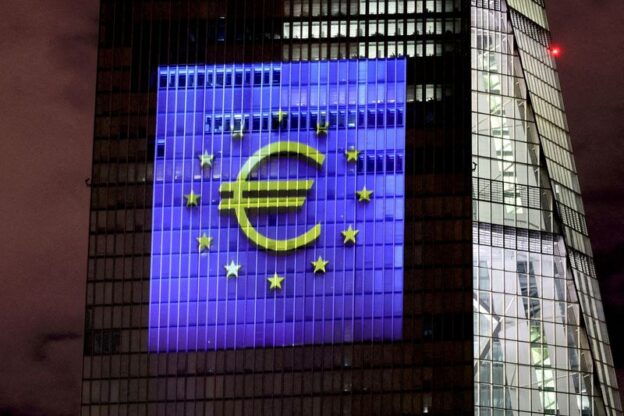Please try another search
Economy src4 hours ago (Sep src7, 2022 02:05PM ET)
© Reuters. FILE PHOTO: A symphony of light consisting of bars, lines and circles in blue and yellow, the colours of the European Union, illuminates the south facade of the European Central Bank (ECB) headquarters in Frankfurt, Germany, December 30, 202src. REUTERS/Wol
By Padraic Halpin and Conor Humphries
WEXFORD, Ireland (Reuters) -The European Central Bank could raise interest rates into next year, causing pain for consumers as it tries to depress demand that is now increasingly adding to sky high inflation, chief economist Philip Lane said on Saturday.
With inflation approaching double digit territory, the ECB delivered two oversized rate hikes in July and September, and promised even more action as even long term price growth expectations are now moving above its 2% target.
“We do think that this is going to dampen demand, we’re not going to pretend this is pain free,” Lane told a conference. “Demand is now a source of inflation pressure, it was not six or nine months ago in the same way it now is.”
At 0.75%, the ECB’s deposit rate is still too low as it continues to stimulate the economy, so the ECB’s job is not yet done, Lane added.
Most economists estimate that the neutral rate, where the ECB is neither stimulating nor holding back growth, is between src.5% and 2%. Markets however see the top of the rate cycle higher and investors now price in rates just above 2.5% next spring.
Lane had argued for months that the current inflation is primarily due to the shock caused by expensive energy prices. Monetary policy is largely powerless against such supply shocks so the ECB was among the last major central banks to hike rates.
But price growth has now broadened out and started to seep into all aspects of life while robust consumer demand is also driving prices.
Although Lane said rates could continue to go up at each remaining meeting this year and may rise early next year, too, the ECB is keeping an open mind about where to stop and will decide meeting by meeting.
Lane added that the euro zone economy is likely to flatline over the winter months and a recession could not be ruled out given high energy prices and a shortage of .
“If we think our base case is to barely grow, a technical recession – falling into a mild recession – cannot be ruled out,” he said separately in an interview with Irish broadcaster RTE.
Related Articles

Comments are closed